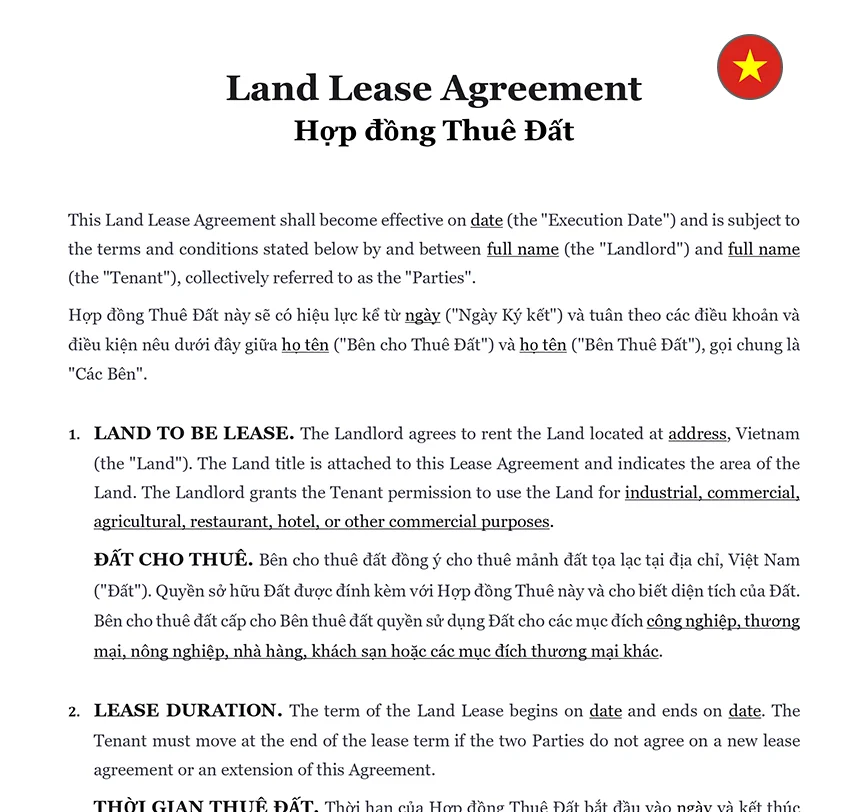Ready to use legal template
Drafted by experienced lawyers
Vietnamese-English translation
Ready to use legal template
Drafted by lawyers
Vietnamese-English translation
Home › Rent your property › Land lease agreement
Learn more about Land Lease Agreement in Vietnam
A Land Lease Agreement is a legal contract between a landowner and a tenant that grants the tenant the right to use the land for a specific purpose over a defined period. In Vietnam, land lease arrangements are commonly used for agricultural, commercial, and industrial projects, and must comply with the Land Law and related regulations. This agreement outlines essential terms such as lease duration, rental payments, permitted land use, maintenance responsibilities, and termination conditions. A properly drafted Land Lease Agreement helps protect the interests of both parties and ensures regulatory compliance. Download our Land Lease Agreement, available in an easy to edit Word format and drafted by expert in English and Vietnamese.
Table of contents
-
What is the duration of the Land Lease Agreement?
-
What is included in a Land Lease Agreement in Vietnam?
-
Are there any restrictions on how the land can be used in Vietnam?
-
What are the responsibilities of Landlord and Tenant?
-
What approvals or permits are required for specific uses of the land?
-
Are there any environmental or zoning regulations in Vietnam?
-
Who is responsible for paying property taxes on the land?
What is the duration of a Land Lease Agreement?
The duration of a Land Lease Agreement in Vietnam can vary depending on the terms negotiated between the landlord and the tenant. Typically, land lease agreements in Vietnam can range from short-term leases, such as a few years, to long-term leases spanning several decades.
The specific duration is determined based on factors such as the intended use of the land, investment requirements, and the preferences of both parties involved. It’s common for long-term leases to have durations of 20 years or more, with the possibility of renewal upon expiration, subject to mutual agreement.
ℹ️ We also offer a Lease Amendment template, allowing for modifications to an existing lease agreement without the need to draft a new one, encompassing lease term extensions, rent adjustments, and the addition of new lessees.
However, it’s essential for both parties to clearly specify the duration and any renewal provisions within the Land Lease Agreement to avoid misunderstandings in the future.
What is included in a Land Lease Agreement in Vietnam?
A Land Lease Agreement in Vietnam typically includes:
1. Identification of the Parties
Clearly stating the names and details of the landlord (the landowner) and the tenant (the individual or entity leasing the land).
2. Description of the Leased Land
Providing a detailed description of the leased land, including its location, boundaries, and any specific features or restrictions.
3. Lease Term
Specifying the duration of the lease, including the start and end dates, along with any provisions for renewal or termination.
4. Rent Payment Terms
Outlining the amount of rent to be paid, the frequency of payments, and the accepted methods of payment.
5. Responsibilities of the Parties
Defining the obligations and responsibilities of both the landlord and the tenant, such as maintenance and repair responsibilities, land use restrictions, and compliance with local regulations.
6. Use of the Land
Stating the permitted uses of the leased land and any restrictions or prohibitions on certain activities.
7. Default and Remedies
Detailing the consequences of default by either party, including provisions for late payments, breaches of the agreement, and dispute resolution mechanisms.
Are there any restrictions on how the land can be used in Vietnam?
Yes, there are various restrictions on how land can be used in Vietnam, which are typically governed by local regulations and zoning laws. Some common restrictions include:
| ➤ Zoning Regulations: Different areas are designated for specific purposes, such as residential, commercial, industrial, agricultural, or mixed-use. Land use must comply with the zoning regulations of the designated area. |
| ➤ Land Use Planning: Vietnam has national and local land use planning regulations that dictate the permitted land uses in different regions. Any proposed land use must align with the approved land use plans for the area. |
| ➤ Environmental Regulations: Certain areas may have environmental protection regulations that restrict land use to prevent pollution, protect natural habitats, or preserve cultural heritage sites. |
| ➤ Building Regulations: There may be restrictions on the construction of buildings or structures, including height limits, setback requirements, and architectural design standards. |
| ➤ Agricultural Land Restrictions: Agricultural land may be subject to specific regulations aimed at promoting sustainable agriculture, protecting farmland, and preserving agricultural ecosystems. |
| ➤ Special Economic Zones: Some areas in Vietnam, such as special economic zones or investment promotion zones, may have specific regulations governing land use to attract investment and promote economic development. |




